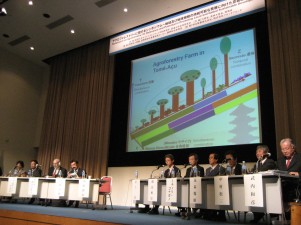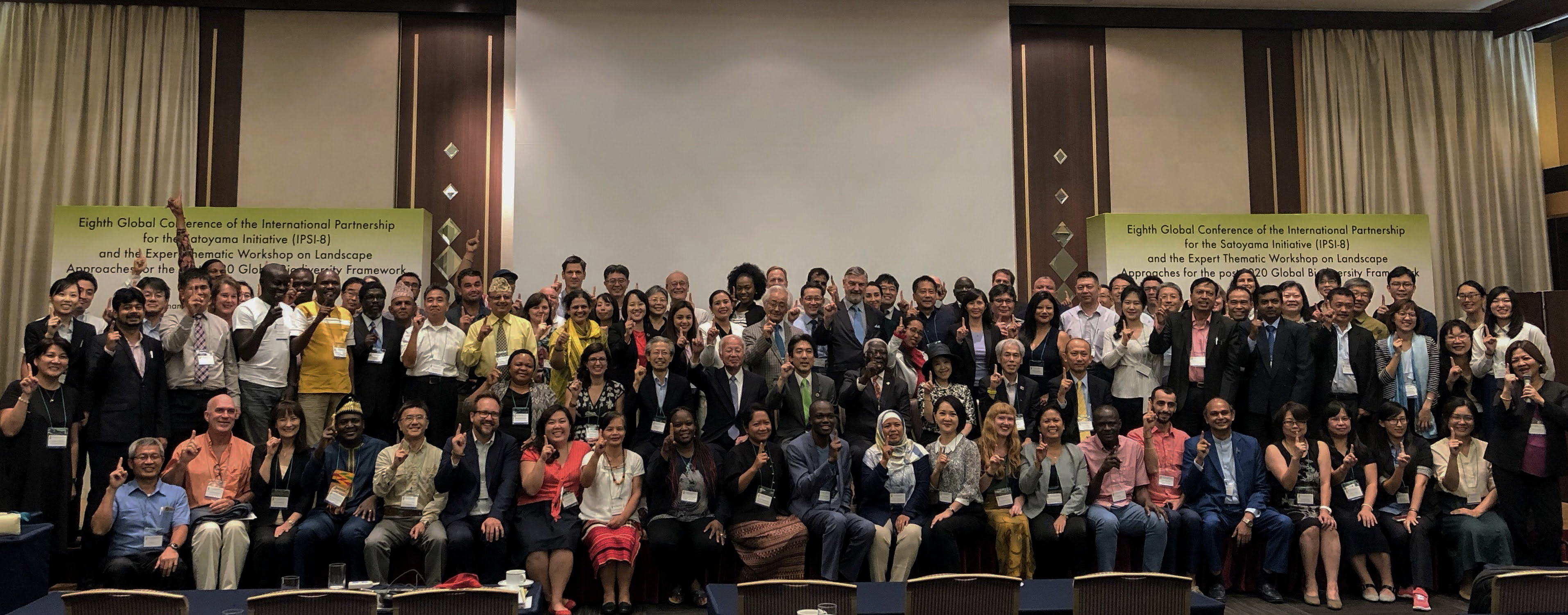A Symposium on Agroforestry, Relevance and potential in promoting local and global sustainable development was held at UNU Tokyo on 16 December 09. The discussion covered both theoretical and practical issues including its relationship with the Satoyama approach. It explored the current situation and significance of Agroforestry.
■ Prof. Kazuhiko Takeuchi (Vice Rector, The United Nations University (UNU)), opened the symposium by greeting the attendees on behalf of the organizers. His address was followed by further words of welcome from Mr. Shuji Kira (Parliamentary Vice Minister for the Ministry of Foreign Affairs), Mr. Yorimitsu Tsumoto (Director-General,Private Forest Department, Forestry Agency, Ministry of Agriculture, Forestry and Fisheries) and Mr. Tsunao Watanabe (Deputy Director-General, Nature Conservation Bureau, Ministry of the Environment), who delivered greetings on behalf of the co-hosting entities.
■ Session 1: In the session entitled “The Present Day Significance of Agroforestry”, the speakers described conceptual similarities between agroforestry and satoyama/satoyama landscapes and the effectiveness of agroforestry as means of counteracting phenomena such as climate change and desertification, and promoting biodiversity, among other things.
- Prof. Kazuhiko Takeuchi, Vice‐Rector, United Nations University: “ Significance of Agroforestry and its Relationship with Satoyama Landscape”
On the topic of satoyama landscapes, which contribute to biodiversity conservation, Prof. Takeuchi described the mosaic-like patterns of land usage, the human-nature relationships and the differences between satoyama landscapes and agroforestry.
- Dr. Dennis Garrity , Director General, the World Agroforestry Centre (ICRAF) : “ Creating a New Vision for an Evergreen Agriculture”
Based on discussions that took place at the 2nd World Agroforestry Congress, which was hosted by The World Agroforestry Centre (ICRAF) and the United Nations Environment Programme (UNEP) in August 2009, Dr. Garrity delivered a presentation on the significance of agroforestry in food security and conservation and recovery of natural resources and discussed measures for promoting agroforestry.
- Mr. Yoshihiro Natori , Senior Fellow, United Nations University Institute of Advanced Studies: “ The Satoyama Initiative”
Mr. Natori described the activities of “The Satoyama Initiative,” an undertaking that the Ministry of the Environment and The United Nations University Institute of Advanced Studies (UNU-IAS) have joined forces to promote in the lead up to The Tenth Conference of the Parties to the Convention on Biological Diversity.
■ Session 2: In the session entitled “Good Agroforestry Practice”, the speakers provided information on case studies in Brazil, Indonesia, Malaysia and Paraguay. In the case of Brazilian case studies, there were presentations in which companies involved in the industry provided detailed information on the commercialization of sustainable agricultural products, as well as a presentation from the perspective of sustainable agriculture. Various other case studies were presented: an Indonesian case study, where agroforestry has resolved land disputes and thus contributed to watershed management and enhancing the lives of small farmers, a Malaysian case study, where a technical study on conserving rainforests by using agroforestry has succeeded, and a Paraguay case study, where obtaining Clean Development Mechanism (CDM) approval for small-scale tree-planting has made it possible to use credit to stimulate development of the rural villages concerned.
- Mr. Michinori Konagano , Ex-Tomé-Açu Municipal Secretary of Agriculture, Tourism and Environment: “ Agroforestry Systems in the Amazon”
Mr. Konagano described agroforestry projects conducted by Brazilians of Japanese descent in the city of Tome açu since the 1980′s as sustainable agriculture that placed a high value on biodiversity.
- Mr. Makoto Nagasawa, CEO & President, Fruta Fruta, Inc.: “ Economy Recovers Forest”
Mr. Nagasawa explained from the point of view of companies that import the products of agroforestry in Tome açu, Japanese consumers can also support the reforestation of the Amazon by purchasing such products.
- Mr. Ikuo Aramori, Senior Executive Officer and Managing Director, Food and Health R&D Laboratories, Meiji Seika Kaisha, Ltd.: “ Support for Reforestation in Amazon with Cacao Bean”
Among the things that Mr. Aramori described were how it came about that Japan began to import cocoa, the key product of agroforestry in Tome açu as well as what they expect for the future.
- Dr. Fahmuddin Agus, Senior Researcher, Indonesian Soil Research Institute: “ A Case of Agroforestry Practices in Indonesia: Watershed Management using Payments for Environmental Services (PES)”
Dr. Agus described a case study in which agroforestry on the island of Sumatra has contributed to suppressing the deposition of sediment in hydroelectric reservoirs, as well as securing stable coffee harvests and, therefore, securing incomes.
- Dr. Shozo Nakamura, Director, Kyushu Research Center, Forestry and Forest Products Research Institute: “ Development of Agroforestry Technology for the Rehabilitation of Tropical Forests”
Dr. Nakamura introduced a technical case study in Malaysia. He explained appropriate crop selection and other activities for securing incomes in the short term, as well as suitable tree-planting methods for regenerating tropical rainforests in the mid to long term.
- Mr. Eiji Matsubara, Project Director, Japan International Research Center for Agricultural Sciences: “ Rural Development and Reforestation CDM in Paraguay”
Mr. Matsubara described a case study in Paraguay where rural development methods through small-scale tree planting are being developed. This project is underway owing to collaboration between the Japan International Research Center for Agricultural Sciences, The Ministry of Agriculture and Livestock (Paraguay) and Ministry of the Environment (Paraguay), among other entities. The same practices were first recorded at a small-scale CDM tree-planting project that was operated by the United Nations in September, 2009.
■ Session 3: In the session entitled, ” Potential of Agroforestry”, the following 4 experts joined the presenters from sessions 1 and 2 in a panel discussion based on the presentations that had been delivered thus far. First of all, the 4 experts delivered the following presentations:
- Dr. Masaaki Yamada, Senior Assistant Professor, Tokyo University of Agriculture and Technology: “ Nikkei Agroforestry in the Eastern Amazon”
Dr. Yamada explained agroforestry in Tome açu, focusing mainly on technical aspects.
- Prof. Makoto Inoue, Professor, University of Tokyo: “ Importance of Collaborative Governance & its design guidelines”
Prof. Inoue touted “collaborative governance” as a social system for sustainable forest management, based on open-minded localism, commitment principles and fair profit sharing, among other things.
- Mr. Hiroki Miyazono, Executive Technical Advisor, Global Environment Department, Japan International Cooperation Agency: “ JICA’s Cooperation on Agroforestry”
Mr. Miyazno provided an overview of agroforestry-related collaboration projects conducted by JICA, particularly case studies in Ethiopia and Laos.
- Mr. Masashi Yokota, Executive Director, Non Profit Organization HANDS (Health and Development Service): “ HANDS Project for Promotion of Agroforestry in the West Amazon”
Mr. Yokota provided information about a project that HANDS is currently operating in Manicoro in the Western Amazon, Brazil, which aims to enhance the lives of local residents through agroforestry.
Following the presentations described above, the panelists continued to exchange opinions, focusing mainly on global issues associated with promoting agroforestry and local issues in the Amazon region.
In response to the presentations and the discussion, the moderator, UNU Vice Rector Prof. Takeuchi, provided the following summary:
[Summary]
1. As international interest in climate change and biodiversity grows, it will be extremely constructive if agroforestry, satoyama projects and other related endeavors which carry out sustainable forestry and agriculture while conserving forests become more widely understood, both within Japan and overseas.
2. Ideas about agroforestry, which is also known as “agriculture that produces forests,” and the practical application of those ideas will not only promote economic and social development of local communities through sustainable forestry and agriculture, it will also make an extremely significant contribution to solving global issues such as climate change, biodiversity loss and desertification.
3. The Satoyama Initiative and the World Agroforestry Centre (ICRAF), which share a common awareness as well as activities to promote agroforestry, must strengthen their collaboration.
4. The following points will be the keys to the success of agroforestry projects.
1) Technical aspects: popularizing proper cultivation etc.-related know-how.
2) Social aspects: suitable relationships between the local residents who will implement the projects and external participants.
3) Economic aspects: the role of commercial activities as the “engine” that will drive agroforestry projects.
Although there has been renewed awareness of the technical problems and governance-related issues concerned with agroforestry, the most important thing is for agroforestry to be positioned as a chiefly company-oriented engine which, in and of itself, will drive society, rather than ‘protecting’ what is vanishing. In projects, it is important that the activities are such that various stakeholders are involved and are able to reap benefits, through the enhancement of technology, systems and marketing.
5. Miscellaneous
1) It would be beneficial if the World Agroforestry Centre (ICRAF) strengthened its links with the Japanese government and the UNU. We anticipate developing the discussion further when we co-host a side event at The Tenth Conference of the Parties to the Convention on Biological Diversity (CBD/COP10), which will be convened in October 2010.
2) In terms of the aid provided by industrialized nations to developing nations, reform of the ODA Scheme would be beneficial.
A movement that contributed to the improvement of the environment by taking into account the environmental impact of development assistance, rather than merely considering the amount of assistance, would be beneficial.
Finally, Prof. Govindan Prayil, Director of UNU-IAS (Vice Rector of UNU) made closing remarks on behalf of the hosts and thus, the symposium was concluded.

Presentation

Panel Discussion
Agenda and Meeting Documents
Programme
Participants
Speakers’ Profile
Presentations
Significance of Agroforestry and its Relationship with Satoyama Landscape
Kazuhiko Takeuchi, Vice‐Rector, United Nations University download
Creating a New Vision for an Evergreen Agriculture
Dennis Garrity, Director General, the World Agroforestry Centre (ICRAF) download
The Satoyama Initiative
Yoshihiro Natori, Senior Fellow, United Nations University Institute of Advanced Studies download
Agroforestry Systems in the Amazon
Michinori Konagano, Ex-Tome-Acu Municipal Secretary of Agriculture, Tourism and Environment download
Economy Recovers Forest
Makoto Nagasawa, CEO & President, Fruta Fruta, Inc download
Support for Reforestation in Amazon with Cacao Bean
Ikuo Aramori, Senior Executive Officer and Managing Director, Food and Health R&D Laboratories, Meiji Seika Kaisha, Ltd. download
A Case of Agroforestry Practices in Indonesia: Watershed Management using Payments for Environmental Services (PES)
Fahmuddin Agus, Senior Researcher, Indonesian Soil Research Institute download
Development of Agroforestry Technology for the Rehabilitation of Tropical Forests
Shozo Nakamura, Director, Kyushu Research Center, Forestry and Forest Products Research Institute download
Rural Development and Reforestation CDM in Paraguay
Eiji Matsubara, Project Director, Japan International Research Center for Agricultural Sciences download
Nikkei Agroforestry in the Eastern Amazon
Masaaki Yamada, Professor, Tokyo University of Agriculture and Technology download
Importance of Collaborative Governance & its Design Guidelines
Makoto Inoue, Professor, University of Tokyo download
JICA’s Cooperation on Agroforestry
Hiroki Miyazono, Executive Technical Advisor, Global Environment Department, Japan International Cooperation Agency download
HANDS Project for Promotion of Agroforestry in the West Amazon
Masashi Yokota, Executive Director, Non Profit Organization HANDS (Health and Development Service) download



